Ontology in Nursing Care: Health, Theories, and Schools of Thought
VerifiedAdded on 2020/04/01
|7
|1883
|58
Essay
AI Summary
This essay delves into the concept of ontology within the context of nursing care, exploring the multifaceted definitions of health and the various ontological schools of thought. The essay begins by examining the evolution of the health concept in nursing, highlighting its complexity and the diverse dimensions it encompasses, as defined by organizations like the World Health Organization and prominent nursing theorists. It then proceeds to analyze the four major schools of ontological thought: Critical Theory, Post-positivism, Complexity/Relationality, and Human Science, providing a detailed overview of each school's principles, methodologies, and contributions to nursing practice. Furthermore, the essay discusses the significance of human science in nursing research, practice, and knowledge development, emphasizing the phenomenological perspective and the importance of understanding patients' experiences. The essay concludes by contrasting the dominant post-positivist view with the human science approach, advocating for a holistic understanding of health and patient care through the integration of patient experiences and theoretical frameworks.
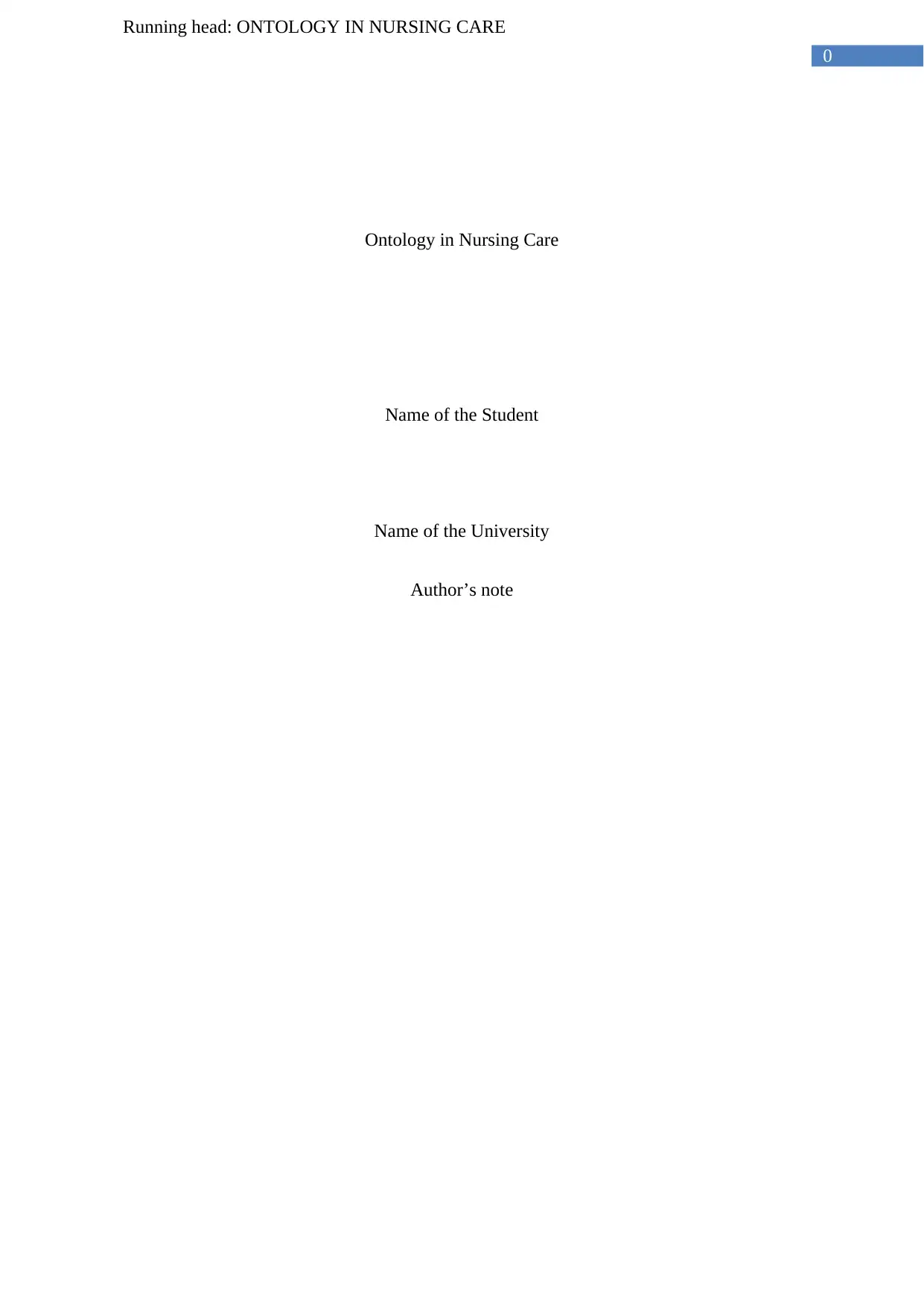
0
Running head: ONTOLOGY IN NURSING CARE
Ontology in Nursing Care
Name of the Student
Name of the University
Author’s note
Running head: ONTOLOGY IN NURSING CARE
Ontology in Nursing Care
Name of the Student
Name of the University
Author’s note
Paraphrase This Document
Need a fresh take? Get an instant paraphrase of this document with our AI Paraphraser
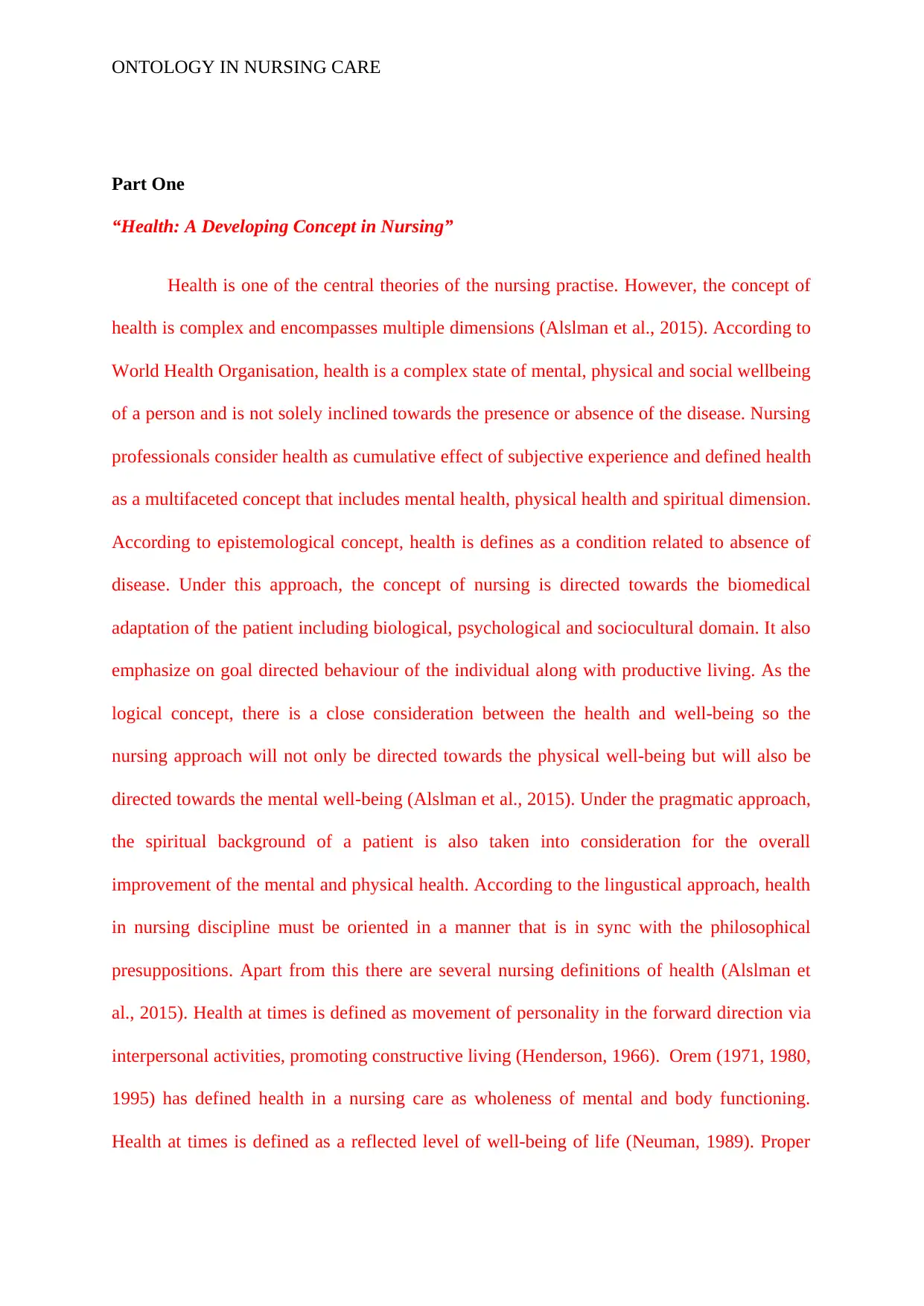
ONTOLOGY IN NURSING CARE
Part One
“Health: A Developing Concept in Nursing”
Health is one of the central theories of the nursing practise. However, the concept of
health is complex and encompasses multiple dimensions (Alslman et al., 2015). According to
World Health Organisation, health is a complex state of mental, physical and social wellbeing
of a person and is not solely inclined towards the presence or absence of the disease. Nursing
professionals consider health as cumulative effect of subjective experience and defined health
as a multifaceted concept that includes mental health, physical health and spiritual dimension.
According to epistemological concept, health is defines as a condition related to absence of
disease. Under this approach, the concept of nursing is directed towards the biomedical
adaptation of the patient including biological, psychological and sociocultural domain. It also
emphasize on goal directed behaviour of the individual along with productive living. As the
logical concept, there is a close consideration between the health and well-being so the
nursing approach will not only be directed towards the physical well-being but will also be
directed towards the mental well-being (Alslman et al., 2015). Under the pragmatic approach,
the spiritual background of a patient is also taken into consideration for the overall
improvement of the mental and physical health. According to the lingustical approach, health
in nursing discipline must be oriented in a manner that is in sync with the philosophical
presuppositions. Apart from this there are several nursing definitions of health (Alslman et
al., 2015). Health at times is defined as movement of personality in the forward direction via
interpersonal activities, promoting constructive living (Henderson, 1966). Orem (1971, 1980,
1995) has defined health in a nursing care as wholeness of mental and body functioning.
Health at times is defined as a reflected level of well-being of life (Neuman, 1989). Proper
Part One
“Health: A Developing Concept in Nursing”
Health is one of the central theories of the nursing practise. However, the concept of
health is complex and encompasses multiple dimensions (Alslman et al., 2015). According to
World Health Organisation, health is a complex state of mental, physical and social wellbeing
of a person and is not solely inclined towards the presence or absence of the disease. Nursing
professionals consider health as cumulative effect of subjective experience and defined health
as a multifaceted concept that includes mental health, physical health and spiritual dimension.
According to epistemological concept, health is defines as a condition related to absence of
disease. Under this approach, the concept of nursing is directed towards the biomedical
adaptation of the patient including biological, psychological and sociocultural domain. It also
emphasize on goal directed behaviour of the individual along with productive living. As the
logical concept, there is a close consideration between the health and well-being so the
nursing approach will not only be directed towards the physical well-being but will also be
directed towards the mental well-being (Alslman et al., 2015). Under the pragmatic approach,
the spiritual background of a patient is also taken into consideration for the overall
improvement of the mental and physical health. According to the lingustical approach, health
in nursing discipline must be oriented in a manner that is in sync with the philosophical
presuppositions. Apart from this there are several nursing definitions of health (Alslman et
al., 2015). Health at times is defined as movement of personality in the forward direction via
interpersonal activities, promoting constructive living (Henderson, 1966). Orem (1971, 1980,
1995) has defined health in a nursing care as wholeness of mental and body functioning.
Health at times is defined as a reflected level of well-being of life (Neuman, 1989). Proper
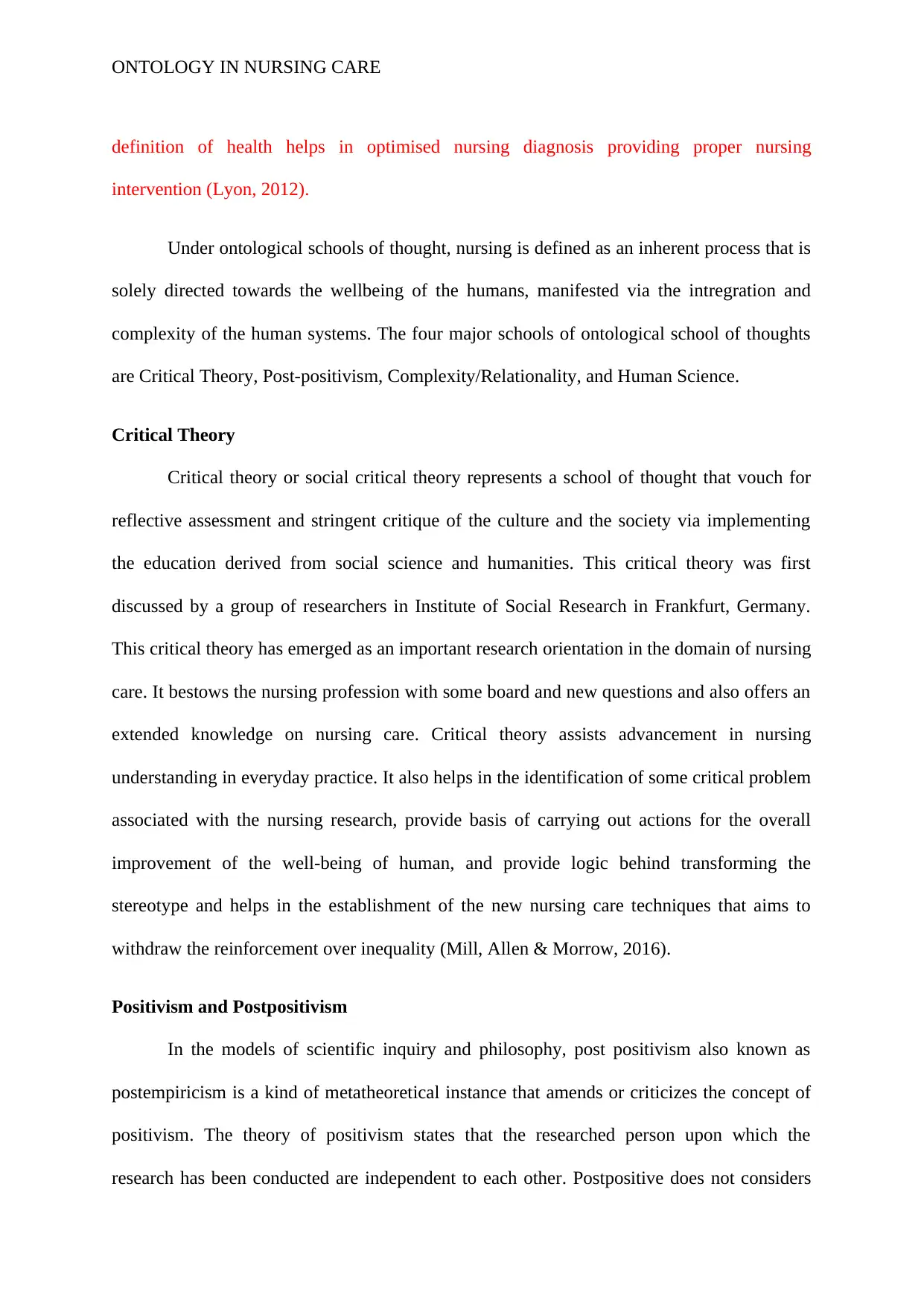
ONTOLOGY IN NURSING CARE
definition of health helps in optimised nursing diagnosis providing proper nursing
intervention (Lyon, 2012).
Under ontological schools of thought, nursing is defined as an inherent process that is
solely directed towards the wellbeing of the humans, manifested via the intregration and
complexity of the human systems. The four major schools of ontological school of thoughts
are Critical Theory, Post-positivism, Complexity/Relationality, and Human Science.
Critical Theory
Critical theory or social critical theory represents a school of thought that vouch for
reflective assessment and stringent critique of the culture and the society via implementing
the education derived from social science and humanities. This critical theory was first
discussed by a group of researchers in Institute of Social Research in Frankfurt, Germany.
This critical theory has emerged as an important research orientation in the domain of nursing
care. It bestows the nursing profession with some board and new questions and also offers an
extended knowledge on nursing care. Critical theory assists advancement in nursing
understanding in everyday practice. It also helps in the identification of some critical problem
associated with the nursing research, provide basis of carrying out actions for the overall
improvement of the well-being of human, and provide logic behind transforming the
stereotype and helps in the establishment of the new nursing care techniques that aims to
withdraw the reinforcement over inequality (Mill, Allen & Morrow, 2016).
Positivism and Postpositivism
In the models of scientific inquiry and philosophy, post positivism also known as
postempiricism is a kind of metatheoretical instance that amends or criticizes the concept of
positivism. The theory of positivism states that the researched person upon which the
research has been conducted are independent to each other. Postpositive does not considers
definition of health helps in optimised nursing diagnosis providing proper nursing
intervention (Lyon, 2012).
Under ontological schools of thought, nursing is defined as an inherent process that is
solely directed towards the wellbeing of the humans, manifested via the intregration and
complexity of the human systems. The four major schools of ontological school of thoughts
are Critical Theory, Post-positivism, Complexity/Relationality, and Human Science.
Critical Theory
Critical theory or social critical theory represents a school of thought that vouch for
reflective assessment and stringent critique of the culture and the society via implementing
the education derived from social science and humanities. This critical theory was first
discussed by a group of researchers in Institute of Social Research in Frankfurt, Germany.
This critical theory has emerged as an important research orientation in the domain of nursing
care. It bestows the nursing profession with some board and new questions and also offers an
extended knowledge on nursing care. Critical theory assists advancement in nursing
understanding in everyday practice. It also helps in the identification of some critical problem
associated with the nursing research, provide basis of carrying out actions for the overall
improvement of the well-being of human, and provide logic behind transforming the
stereotype and helps in the establishment of the new nursing care techniques that aims to
withdraw the reinforcement over inequality (Mill, Allen & Morrow, 2016).
Positivism and Postpositivism
In the models of scientific inquiry and philosophy, post positivism also known as
postempiricism is a kind of metatheoretical instance that amends or criticizes the concept of
positivism. The theory of positivism states that the researched person upon which the
research has been conducted are independent to each other. Postpositive does not considers
⊘ This is a preview!⊘
Do you want full access?
Subscribe today to unlock all pages.

Trusted by 1+ million students worldwide
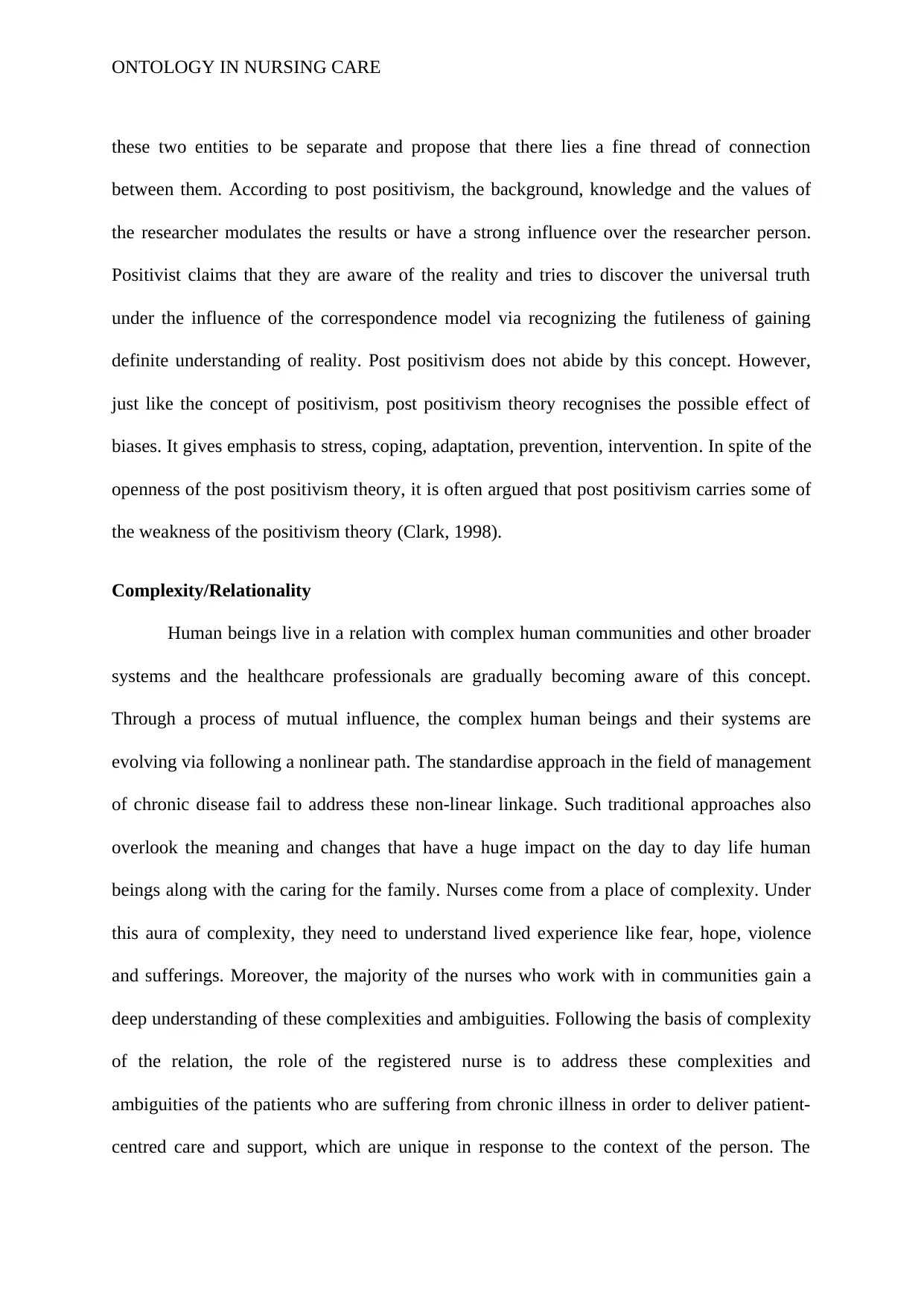
ONTOLOGY IN NURSING CARE
these two entities to be separate and propose that there lies a fine thread of connection
between them. According to post positivism, the background, knowledge and the values of
the researcher modulates the results or have a strong influence over the researcher person.
Positivist claims that they are aware of the reality and tries to discover the universal truth
under the influence of the correspondence model via recognizing the futileness of gaining
definite understanding of reality. Post positivism does not abide by this concept. However,
just like the concept of positivism, post positivism theory recognises the possible effect of
biases. It gives emphasis to stress, coping, adaptation, prevention, intervention. In spite of the
openness of the post positivism theory, it is often argued that post positivism carries some of
the weakness of the positivism theory (Clark, 1998).
Complexity/Relationality
Human beings live in a relation with complex human communities and other broader
systems and the healthcare professionals are gradually becoming aware of this concept.
Through a process of mutual influence, the complex human beings and their systems are
evolving via following a nonlinear path. The standardise approach in the field of management
of chronic disease fail to address these non-linear linkage. Such traditional approaches also
overlook the meaning and changes that have a huge impact on the day to day life human
beings along with the caring for the family. Nurses come from a place of complexity. Under
this aura of complexity, they need to understand lived experience like fear, hope, violence
and sufferings. Moreover, the majority of the nurses who work with in communities gain a
deep understanding of these complexities and ambiguities. Following the basis of complexity
of the relation, the role of the registered nurse is to address these complexities and
ambiguities of the patients who are suffering from chronic illness in order to deliver patient-
centred care and support, which are unique in response to the context of the person. The
these two entities to be separate and propose that there lies a fine thread of connection
between them. According to post positivism, the background, knowledge and the values of
the researcher modulates the results or have a strong influence over the researcher person.
Positivist claims that they are aware of the reality and tries to discover the universal truth
under the influence of the correspondence model via recognizing the futileness of gaining
definite understanding of reality. Post positivism does not abide by this concept. However,
just like the concept of positivism, post positivism theory recognises the possible effect of
biases. It gives emphasis to stress, coping, adaptation, prevention, intervention. In spite of the
openness of the post positivism theory, it is often argued that post positivism carries some of
the weakness of the positivism theory (Clark, 1998).
Complexity/Relationality
Human beings live in a relation with complex human communities and other broader
systems and the healthcare professionals are gradually becoming aware of this concept.
Through a process of mutual influence, the complex human beings and their systems are
evolving via following a nonlinear path. The standardise approach in the field of management
of chronic disease fail to address these non-linear linkage. Such traditional approaches also
overlook the meaning and changes that have a huge impact on the day to day life human
beings along with the caring for the family. Nurses come from a place of complexity. Under
this aura of complexity, they need to understand lived experience like fear, hope, violence
and sufferings. Moreover, the majority of the nurses who work with in communities gain a
deep understanding of these complexities and ambiguities. Following the basis of complexity
of the relation, the role of the registered nurse is to address these complexities and
ambiguities of the patients who are suffering from chronic illness in order to deliver patient-
centred care and support, which are unique in response to the context of the person. The
Paraphrase This Document
Need a fresh take? Get an instant paraphrase of this document with our AI Paraphraser
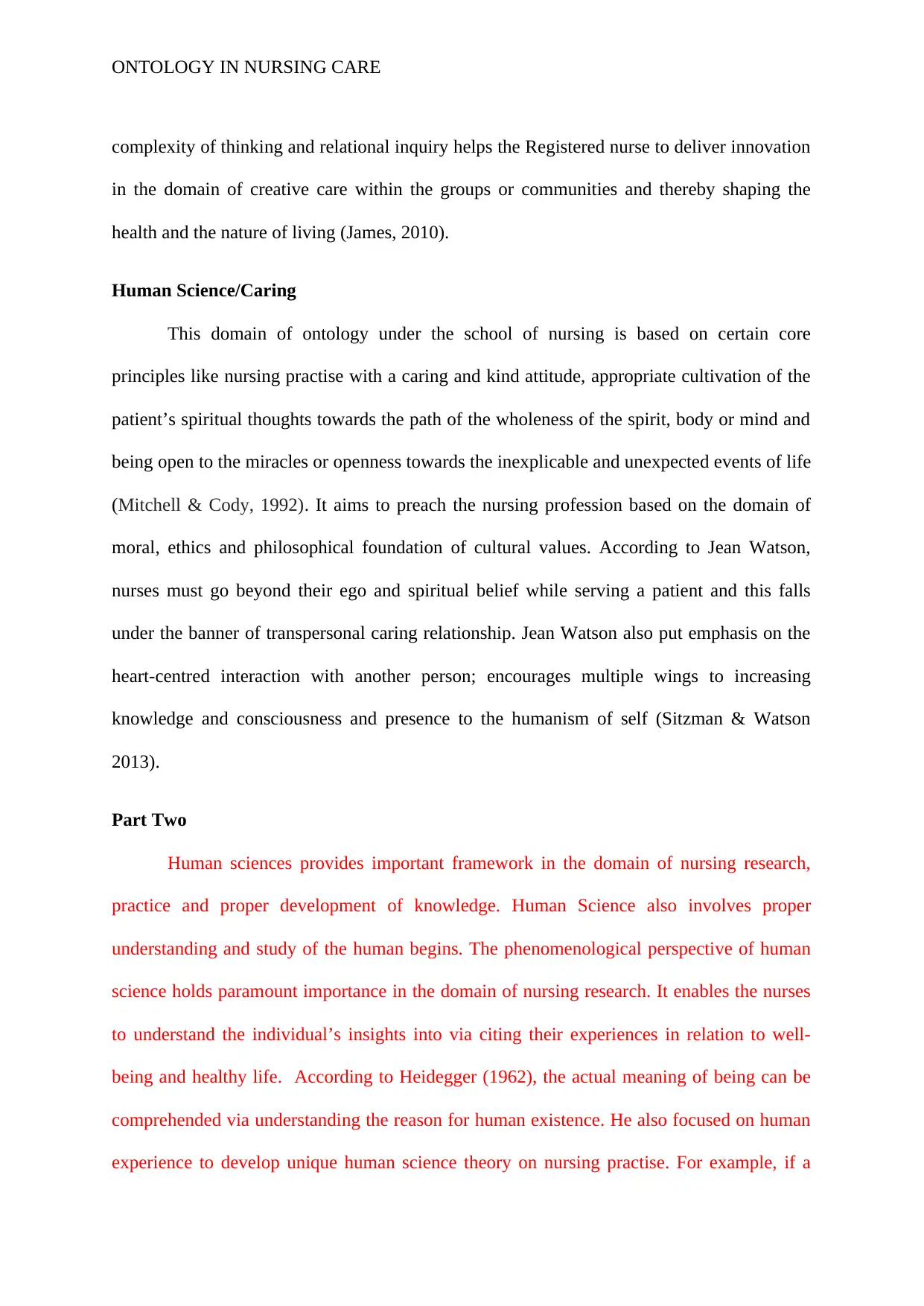
ONTOLOGY IN NURSING CARE
complexity of thinking and relational inquiry helps the Registered nurse to deliver innovation
in the domain of creative care within the groups or communities and thereby shaping the
health and the nature of living (James, 2010).
Human Science/Caring
This domain of ontology under the school of nursing is based on certain core
principles like nursing practise with a caring and kind attitude, appropriate cultivation of the
patient’s spiritual thoughts towards the path of the wholeness of the spirit, body or mind and
being open to the miracles or openness towards the inexplicable and unexpected events of life
(Mitchell & Cody, 1992). It aims to preach the nursing profession based on the domain of
moral, ethics and philosophical foundation of cultural values. According to Jean Watson,
nurses must go beyond their ego and spiritual belief while serving a patient and this falls
under the banner of transpersonal caring relationship. Jean Watson also put emphasis on the
heart-centred interaction with another person; encourages multiple wings to increasing
knowledge and consciousness and presence to the humanism of self (Sitzman & Watson
2013).
Part Two
Human sciences provides important framework in the domain of nursing research,
practice and proper development of knowledge. Human Science also involves proper
understanding and study of the human begins. The phenomenological perspective of human
science holds paramount importance in the domain of nursing research. It enables the nurses
to understand the individual’s insights into via citing their experiences in relation to well-
being and healthy life. According to Heidegger (1962), the actual meaning of being can be
comprehended via understanding the reason for human existence. He also focused on human
experience to develop unique human science theory on nursing practise. For example, if a
complexity of thinking and relational inquiry helps the Registered nurse to deliver innovation
in the domain of creative care within the groups or communities and thereby shaping the
health and the nature of living (James, 2010).
Human Science/Caring
This domain of ontology under the school of nursing is based on certain core
principles like nursing practise with a caring and kind attitude, appropriate cultivation of the
patient’s spiritual thoughts towards the path of the wholeness of the spirit, body or mind and
being open to the miracles or openness towards the inexplicable and unexpected events of life
(Mitchell & Cody, 1992). It aims to preach the nursing profession based on the domain of
moral, ethics and philosophical foundation of cultural values. According to Jean Watson,
nurses must go beyond their ego and spiritual belief while serving a patient and this falls
under the banner of transpersonal caring relationship. Jean Watson also put emphasis on the
heart-centred interaction with another person; encourages multiple wings to increasing
knowledge and consciousness and presence to the humanism of self (Sitzman & Watson
2013).
Part Two
Human sciences provides important framework in the domain of nursing research,
practice and proper development of knowledge. Human Science also involves proper
understanding and study of the human begins. The phenomenological perspective of human
science holds paramount importance in the domain of nursing research. It enables the nurses
to understand the individual’s insights into via citing their experiences in relation to well-
being and healthy life. According to Heidegger (1962), the actual meaning of being can be
comprehended via understanding the reason for human existence. He also focused on human
experience to develop unique human science theory on nursing practise. For example, if a
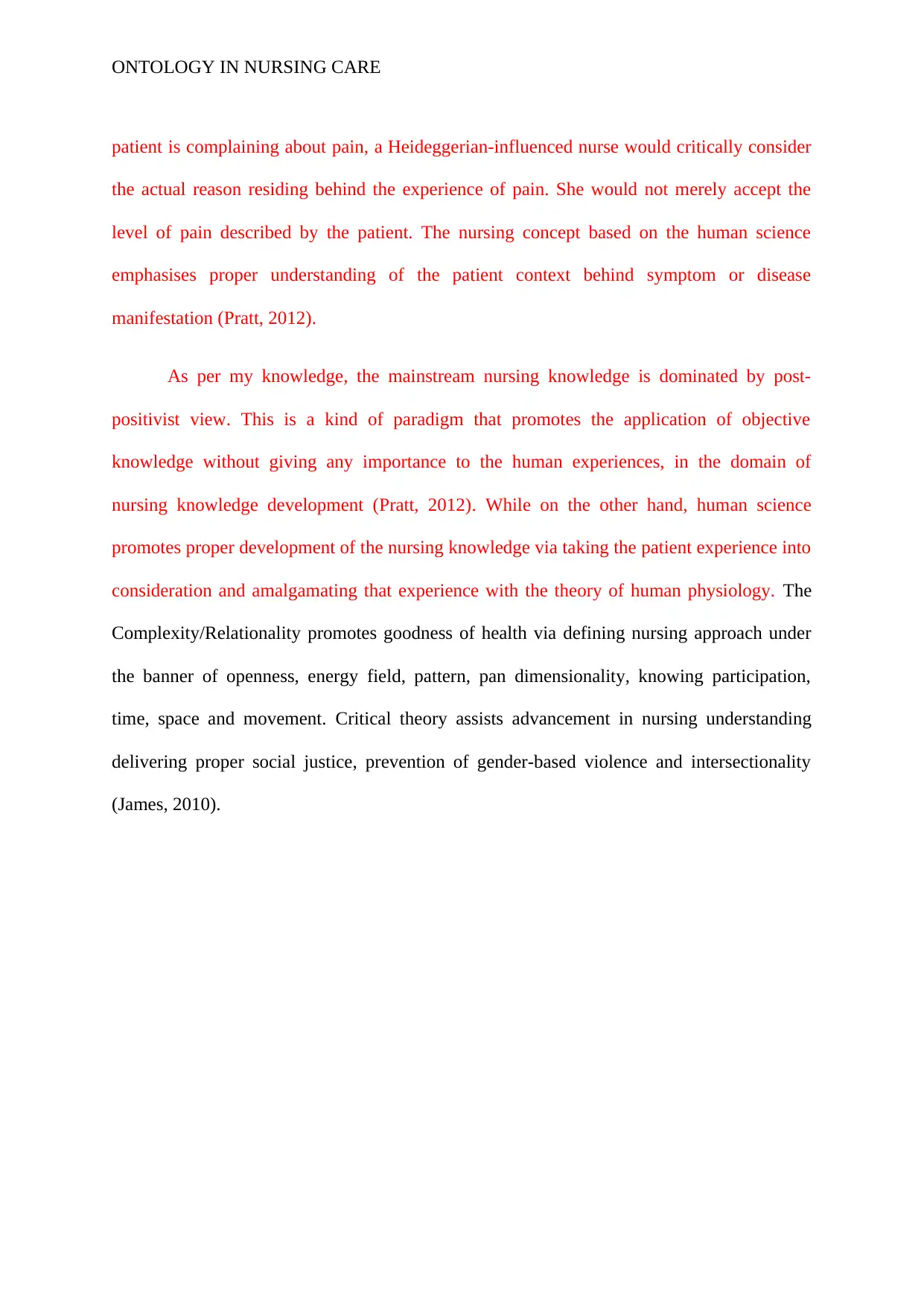
ONTOLOGY IN NURSING CARE
patient is complaining about pain, a Heideggerian-influenced nurse would critically consider
the actual reason residing behind the experience of pain. She would not merely accept the
level of pain described by the patient. The nursing concept based on the human science
emphasises proper understanding of the patient context behind symptom or disease
manifestation (Pratt, 2012).
As per my knowledge, the mainstream nursing knowledge is dominated by post-
positivist view. This is a kind of paradigm that promotes the application of objective
knowledge without giving any importance to the human experiences, in the domain of
nursing knowledge development (Pratt, 2012). While on the other hand, human science
promotes proper development of the nursing knowledge via taking the patient experience into
consideration and amalgamating that experience with the theory of human physiology. The
Complexity/Relationality promotes goodness of health via defining nursing approach under
the banner of openness, energy field, pattern, pan dimensionality, knowing participation,
time, space and movement. Critical theory assists advancement in nursing understanding
delivering proper social justice, prevention of gender-based violence and intersectionality
(James, 2010).
patient is complaining about pain, a Heideggerian-influenced nurse would critically consider
the actual reason residing behind the experience of pain. She would not merely accept the
level of pain described by the patient. The nursing concept based on the human science
emphasises proper understanding of the patient context behind symptom or disease
manifestation (Pratt, 2012).
As per my knowledge, the mainstream nursing knowledge is dominated by post-
positivist view. This is a kind of paradigm that promotes the application of objective
knowledge without giving any importance to the human experiences, in the domain of
nursing knowledge development (Pratt, 2012). While on the other hand, human science
promotes proper development of the nursing knowledge via taking the patient experience into
consideration and amalgamating that experience with the theory of human physiology. The
Complexity/Relationality promotes goodness of health via defining nursing approach under
the banner of openness, energy field, pattern, pan dimensionality, knowing participation,
time, space and movement. Critical theory assists advancement in nursing understanding
delivering proper social justice, prevention of gender-based violence and intersectionality
(James, 2010).
⊘ This is a preview!⊘
Do you want full access?
Subscribe today to unlock all pages.

Trusted by 1+ million students worldwide
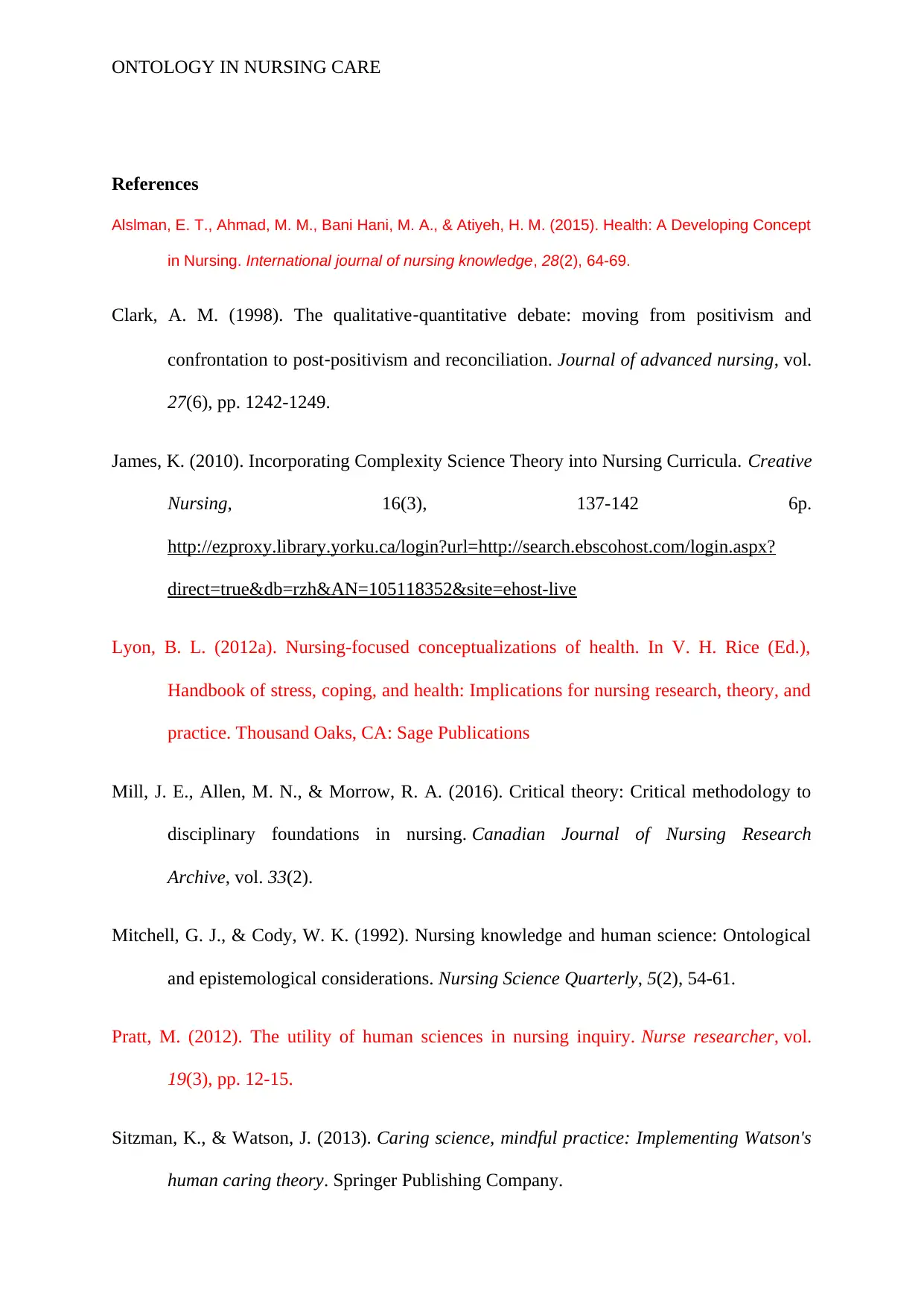
ONTOLOGY IN NURSING CARE
References
Alslman, E. T., Ahmad, M. M., Bani Hani, M. A., & Atiyeh, H. M. (2015). Health: A Developing Concept
in Nursing. International journal of nursing knowledge, 28(2), 64-69.
Clark, A. M. (1998). The qualitative‐quantitative debate: moving from positivism and
confrontation to post‐positivism and reconciliation. Journal of advanced nursing, vol.
27(6), pp. 1242-1249.
James, K. (2010). Incorporating Complexity Science Theory into Nursing Curricula. Creative
Nursing, 16(3), 137-142 6p.
http://ezproxy.library.yorku.ca/login?url=http://search.ebscohost.com/login.aspx?
direct=true&db=rzh&AN=105118352&site=ehost-live
Lyon, B. L. (2012a). Nursing-focused conceptualizations of health. In V. H. Rice (Ed.),
Handbook of stress, coping, and health: Implications for nursing research, theory, and
practice. Thousand Oaks, CA: Sage Publications
Mill, J. E., Allen, M. N., & Morrow, R. A. (2016). Critical theory: Critical methodology to
disciplinary foundations in nursing. Canadian Journal of Nursing Research
Archive, vol. 33(2).
Mitchell, G. J., & Cody, W. K. (1992). Nursing knowledge and human science: Ontological
and epistemological considerations. Nursing Science Quarterly, 5(2), 54-61.
Pratt, M. (2012). The utility of human sciences in nursing inquiry. Nurse researcher, vol.
19(3), pp. 12-15.
Sitzman, K., & Watson, J. (2013). Caring science, mindful practice: Implementing Watson's
human caring theory. Springer Publishing Company.
References
Alslman, E. T., Ahmad, M. M., Bani Hani, M. A., & Atiyeh, H. M. (2015). Health: A Developing Concept
in Nursing. International journal of nursing knowledge, 28(2), 64-69.
Clark, A. M. (1998). The qualitative‐quantitative debate: moving from positivism and
confrontation to post‐positivism and reconciliation. Journal of advanced nursing, vol.
27(6), pp. 1242-1249.
James, K. (2010). Incorporating Complexity Science Theory into Nursing Curricula. Creative
Nursing, 16(3), 137-142 6p.
http://ezproxy.library.yorku.ca/login?url=http://search.ebscohost.com/login.aspx?
direct=true&db=rzh&AN=105118352&site=ehost-live
Lyon, B. L. (2012a). Nursing-focused conceptualizations of health. In V. H. Rice (Ed.),
Handbook of stress, coping, and health: Implications for nursing research, theory, and
practice. Thousand Oaks, CA: Sage Publications
Mill, J. E., Allen, M. N., & Morrow, R. A. (2016). Critical theory: Critical methodology to
disciplinary foundations in nursing. Canadian Journal of Nursing Research
Archive, vol. 33(2).
Mitchell, G. J., & Cody, W. K. (1992). Nursing knowledge and human science: Ontological
and epistemological considerations. Nursing Science Quarterly, 5(2), 54-61.
Pratt, M. (2012). The utility of human sciences in nursing inquiry. Nurse researcher, vol.
19(3), pp. 12-15.
Sitzman, K., & Watson, J. (2013). Caring science, mindful practice: Implementing Watson's
human caring theory. Springer Publishing Company.
1 out of 7
Related Documents
Your All-in-One AI-Powered Toolkit for Academic Success.
+13062052269
info@desklib.com
Available 24*7 on WhatsApp / Email
![[object Object]](/_next/static/media/star-bottom.7253800d.svg)
Unlock your academic potential
Copyright © 2020–2026 A2Z Services. All Rights Reserved. Developed and managed by ZUCOL.





